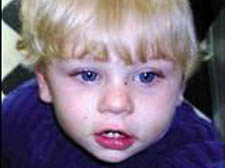|
|
 |
| |

Baby P |
Baby P’s mother ‘needed help and didn’t get it’
CHILDREN on the “at-risk” register are being failed by a healthcare system that should routinely screen parents for psychiatric problems, a leading psychiatrist has claimed.
Adult psychiatrist and senior lecturer Dr Aggrey Burke said deaths like that of Baby P in Haringey could have been avoided if parents were referred for psychiatric assessment.
He warned that a crucial safety net was at risk because of funding cuts and the complicated framework of the healthcare system. Dr Burke said: “Society may like to see the mother in the Baby P case as some kind of evil brute, but I think she is someone who needs help and didn’t get it.
“There were so many meetings with social services, police, doctors, but the parents were never passed up for psychiatric assessment. I suspect the idea of referral was not entertained by the many health visitors, police, social workers and doctors.”
He added: “The health system does not accord much significance to parents with these problems. We have to ask why that is?”
Baby P was seen five times at Whittington Hospital, in Archway, within four days. On December 11, 2006, hospital GP Jerome Ikwueke found “bruising to the forehead, nose, sternum, and right shoulder/breast”.
The child was referred to Haringey’s child abuse investigation team the following day. It is at this point that the parents could have been referred to a psychiatrist, according to Dr Burke.
He said specialist centres should be set up in inner London boroughs to assess parents showing signs of personality disorders. Dr Burke added: “There are teams that could provide this kind of risk assessment but you have to ask who is going to fund it?”
Some experts claim that a decision by the House of Lords in 2005, creating a legal difference between medical and psychological assessments, had led to a funding black hole in psychiatric referrals.
It means local authorities such as Islington cannot be held legally responsible for the mental health of its residents, and so could not be ordered to pay for referrals by the courts.
Dr Stephen Amiel, chairman of Islington’s Local Medical Committee, said: “The fact is that the care service is not set up to deal with people with these kinds of problems. It is too fragmented.
“We did a study at our practice of all patients under 18 and found that one third reached the threshold of being at risk. That is a lot, quite frankly. Working together in teams, with close collaboration, that is the key to solving it.”
Baby P’s ashes have been scattered at an unmarked spot at Islington and St Pancras Cemetery, in East Finchley. Cemetery staff have set aside a large grassy space where tributes of flowers and toys can be left.
A council spokesman said the child’s natural father did not want an overstated headstone.
An Islington Council spokesman said: “We fully understand why people want to leave tributes. At the same time, Baby P’s father’s wishes to maintain the dignity and peace of the area where the ashes of his son and others are scattered.
“So we have set aside a separate area in the cemetery where tributes can be left. Our cemetery is open for all to spend quiet time in reflection.
“Because floral tributes will be removed after a period of time, people might prefer to make a donation to a children’s charity to show their sympathy.”
The number of children and young people on the child protection register was declining, according to a report into Islington’s children’s services carried out by Ofsted inspectors in November 2007. |
 |
|
 |
| |
| |
| |
|
 |
|